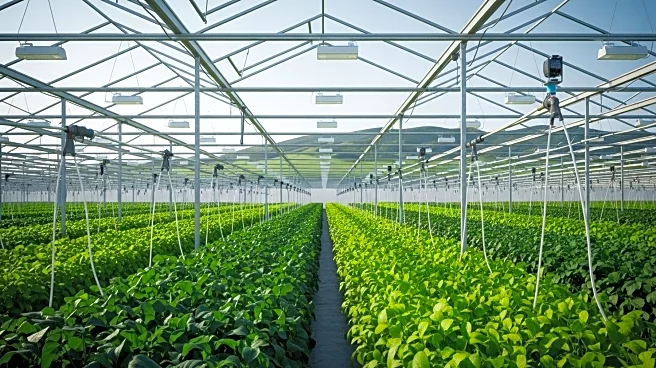What is the story about?
What's Happening?
The climate-resilient agriculture market in the United States is projected to grow significantly, reaching $61.50 billion by 2032. This growth is driven by the increasing adoption of practices and technologies aimed at mitigating the impact of climate change on crop production. Key developments include the launch of drought-tolerant corn seeds by Corteva Agriscience and AI-driven precision irrigation systems by Monsanto. These innovations are designed to enhance crop resilience to extreme weather events such as droughts, floods, and heatwaves. The market is also supported by government programs and investments in agricultural research, as well as the expansion of precision agriculture and soil health management.
Why It's Important?
The growth of the climate-resilient agriculture market is crucial for ensuring food security and maintaining yield stability in the face of climate change. By adopting sustainable farming practices and investing in advanced technologies, the agricultural sector can better withstand adverse weather conditions and reduce environmental impact. This shift towards environmentally sustainable and resource-efficient farming is essential for the long-term viability of agriculture in the U.S. and globally. The market's expansion also presents opportunities for agribusinesses and technology providers to innovate and develop solutions that support climate adaptation and resilience.
What's Next?
As the market continues to grow, stakeholders can expect further advancements in climate-smart agronomic practices and technologies. The integration of AI, IoT, and data analytics will play a significant role in optimizing resource use and enhancing decision-making for farmers. Additionally, ongoing research and development in biotechnology and soil amendment technologies will contribute to improved crop resilience and yield stability. The focus on sustainable agriculture is likely to drive continued investment and collaboration among industry players, government agencies, and research institutions.
Beyond the Headlines
The shift towards climate-resilient agriculture has broader implications for global food systems and environmental sustainability. By prioritizing resilience and sustainability, the agricultural sector can contribute to reducing greenhouse gas emissions and promoting biodiversity. This transition also highlights the importance of collaboration between public and private sectors to address the challenges posed by climate change and ensure the long-term health of ecosystems and communities.
















